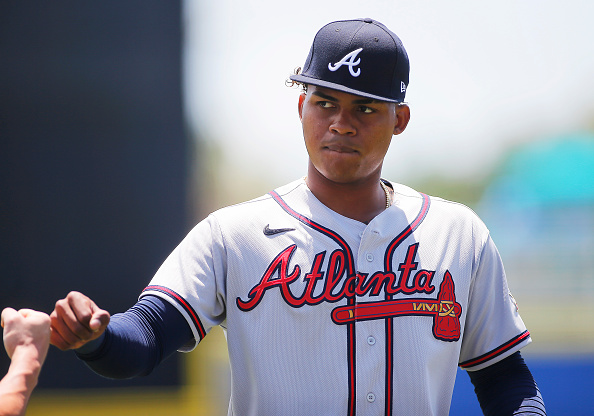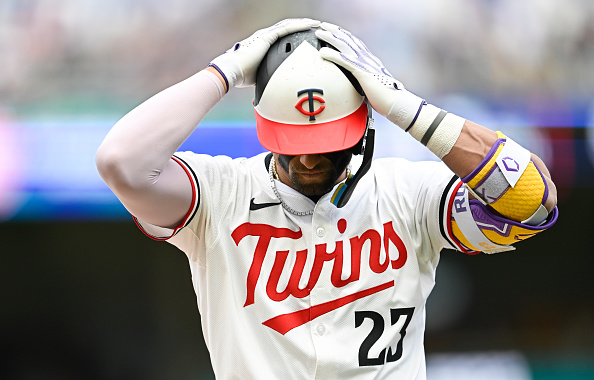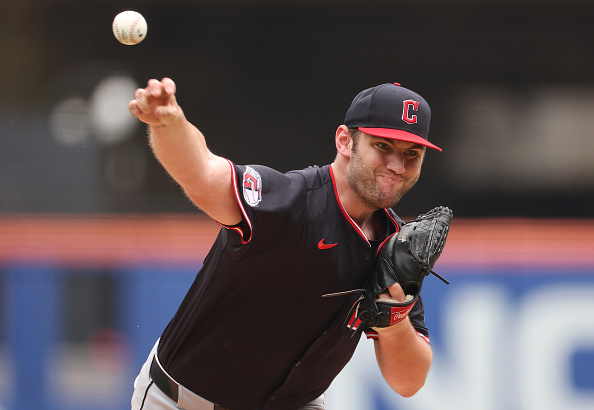The Atlanta Braves made it through the trade deadline without tearing apart their farm system, which is always a good sign. Able to keep their core of top prospects under lock and key, the club’s pipeline even grew this summer following the draft. The selection of pitcher Ryan Cusick headlined the bunch, and he even sneaks into the No. 5 slot in this updated prospect ranking.
Let’s dive into the full list of the Braves’ top-five prospects, complete with grades, analysis, and more.
Make sure to check out all of our Updated Prospect Articles.
1. Cristian Pache, Outfielder
Hit: 50
Power: 45
Run: 70
Arm: 70
Field: 80
Overall: 60
Pache is a top-tier prospect whose defensive tools were on display throughout every level of affiliated ball. The biggest knock on the 2015 international signee is that he is not a terrific offensive talent. He owns a career .119/.157/.209 slash line with two walks and 27 strikeouts through 24 games in the majors and is hitting .244 with 58 strikeouts at Triple-A this year. On a more positive note, though, he is elite in the outfield. Pache’s rise to the majors for the 2020 postseason even caused Ronald Acuña Jr. to shift to a corner role in order that the former could play center. He also has phenomenal baseball IQ, speed, and arm strength.
Going forward, the Braves will look for Pache to become an average hitter. Defense is the highlight of his game, and he surely has many Gold Glove awards in his future. However, Atlanta can’t afford to roster him if he is going to be a liability with the bat in his hands. Specifically, he needs to work on striking out less, which is easier said than done. Pache clearly has intelligence, so it’s time for that to translate to his approach at the plate.
ETA: 2021
2. Shea Langeliers, Catcher
Hit: 50
Power: 55
Run: 35
Arm: 70
Field: 60
Overall: 55
The Braves’ first-round pick in 2019, Langeliers has ascended the club’s farm system and is currently playing in Double-A. One of the best defensive backstops in all of Minor League Baseball, the 23-year-old has incredible athleticism and receiving skills that give him plenty of value behind the plate. He also has a very strong arm that should translate to the MLB level, allowing him to throw out an above-average rate of would-be base-stealers. Despite this elite defensive talent, Langeliers’ ability with the bat in his hands isn’t as phenomenal. Not a poor hitter by any means, the right-hander is slashing .258/.333/.512 with 25 walks and 73 strikeouts at Double-A this year. On a more positive note, he has clobbered 17 home runs, which is up from two at Single-A in 2019.
Catchers are very delicate when it comes to projections, which is why Langeliers is such a valuable prospect. His defensive prowess is easy to project; there is little doubt that he can be an impact player behind the dish in the majors. However, exactly how he translates as a hitter is far from certain. He could eventually become a mainstay in the majors, but it might take a while for him to get acclimated to MLB pitching. As such, it might be wise for the Braves to line up his promotion with the start of the season. This way, he can make his debut directly after facing near-MLB-caliber pitching in Spring Training. This might not be easy, though. The current timeline aligns in a way that suggests Langeliers will open 2022 in Triple-A before making his MLB debut in the summer.
ETA: 2022
3. Drew Waters, Outfielder
Hit: 55
Power: 50
Run: 65
Arm: 60
Field: 55
Overall: 55
While not quite the elite prospect that Pache is, Waters projects to complement him nicely as they both ascend towards the majors. The former second-round pick currently plays at Triple-A, where he is slashing .255/.349/.422 with eight homers, 27 RBI, 32 walks, and 99 strikeouts through 66 games. Evidently, he’s striking out way too much, especially for someone who doesn’t have tremendous power. With that said, he is putting the ball in play and getting on base at a decent clip. This is extra important because he has impressive speed, allowing him to steal bases. He’s already swiped 19 bags his year and is on pace to set a career-high. Meanwhile, Waters is even better defensively. Although he doesn’t project as a center fielder because he is blocked by Pache and Acuña, he still has a great glove and arm, which means he could fit in right field if needed.
Waters has a legitimate chance at being called up when rosters expand in September, but just like with Pache, the strikeouts are a concern. Logic would suggest that his strikeout rate will only increase once he reaches the majors, which is something that neither he nor the Braves can afford to let happen. Still, the future of the Braves’ outfield is bright with Pache and Waters knocking on the door.
ETA: 2021
4. Jared Shuster, Starting Pitcher
Fastball: 55
Slider: 50
Changeup: 60
Control: 45
Overall: 50
Shuster impressed in the 2020 pre-draft process, enough to warrant the Braves selecting him in the first round. He has made his presence felt so far in the minors, posting a very strong WHIP (1.00) and OBA (.203). Through 39.2 innings at High-A this year, he has walked just 12 batters while striking out 52. Shuster’s best pitch is his changeup, which tumbles and is effective in both setting the tone of an at-bat, getting ahead early, or finishing off a batter. Almost as effective is his fastball, which has touched 97 mph. He also throws a decent slider, though it’s currently his tertiary selection until he can develop it into a more lethal breaking ball.
Although he has a solid repertoire, control has been a major issue for the southpaw in the past. He has done a better job of finding the strike zone and limiting walks, so he’s not far from turning the 45 grade into a 50. Still, it would be nice to see more than 40 innings of professional action before proclaiming that his control has, indeed, improved. Despite such a small sample size, Shuster isn’t exceptionally far from the majors. Already 23 years old, he should reach Triple-A in 2022 and could find his way to the majors by mid-2023.
ETA: 2023
5. Ryan Cusick, Relief Pitcher
Fastball: 70
Curveball: 55
Slider: 50
Changeup: 50
Control: 45
Overall: 50
Selected by the Braves in the first round of this summer’s draft, Cusick is a tall right-hander whose best pitch is his fastball. The pitch is absolutely lethal, registering high spin rates and touching triple-digits on numerous occasions. Complementing his heater is a curveball that he has worked on developing into an above-average selection. It has good drop and pairs nicely with his fastball, though it will never be his top offering. He also throws a changeup and slurve-like slider, both of which are solid Nos. 3 and 4 pitches but are merely just that and nothing more. Control is the biggest concern for the 21-year-old; while he led the ACC in strikeout rate in 2021, he also had very high walk rates in each of the last two collegiate seasons.
There have been questions about whether Cusick projects best as a starter or reliever. The high velocity suggests he would work best out of the bullpen, but he has also demonstrated impressive stamina and been able to throw hard late into games. All in all, it’s too early to jump to conclusions here. Cusick’s success in the lower levels of the minors as well as how good his control is will both play instrumental roles in forecasting his long-term projection.
ETA: 2024
What Does the Future Hold?
The Braves have a strong farm system. Drafting Cusick to join Shuster in the pipeline was a very smart choice when looking at various factors, including talent, age, and minor league depth. These two pitchers should see their names rise through prospect rankings over the next couple years, especially as the first three names on this list make their MLB debuts. It’s also worth keeping an eye on 20-year-old outfielder Michael Harris, who was strenuously considered for this list but ultimately just missed the cut.
Check us out on our socials:
Twitter: @PTSTNews and @TalkPrimeTime
Facebook Page: Prime Time Sports Talk
Join our Facebook Group: Prime Time Sports Talk
Instagram: @ptsportstalk
Follow Andersen Pickard on Twitter @AndersenPickard
Main Image Credit:








One Response